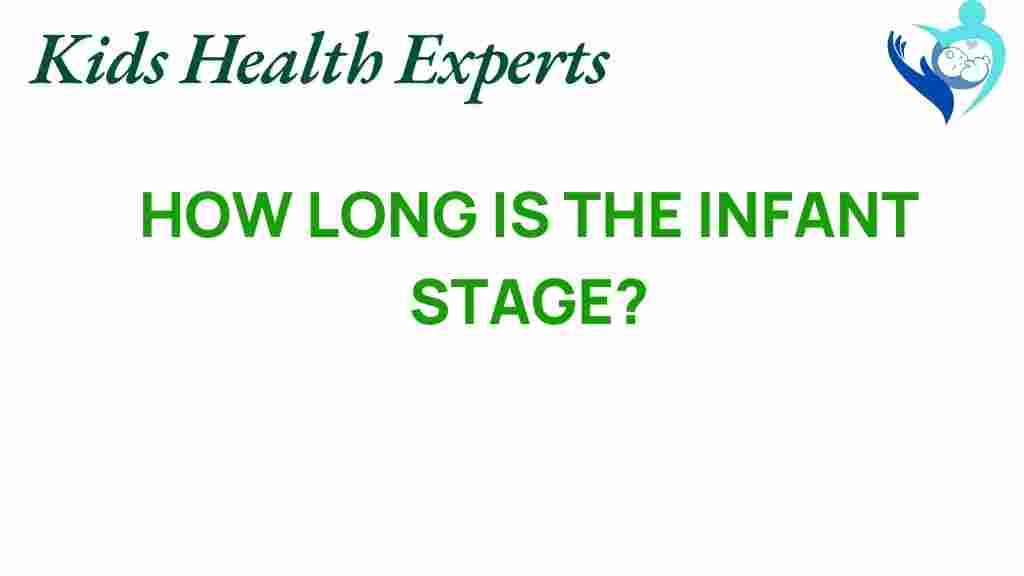Unraveling the Mystery: How Long is the Infant Stage?
The infant stage is a crucial period in a child’s life that lays the foundation for future growth and development. Understanding this phase can help parents provide the best care for their little ones. In this article, we will explore the duration of the infant stage, key development milestones, essential newborn care tips, and the overall growth phases during the first year. Additionally, we will delve into parenting tips and insights from developmental psychology to support your journey through early childhood.
Understanding the Infant Stage
The infant stage typically spans from birth to 12 months of age. During this time, babies undergo rapid physical, emotional, and cognitive growth. It is characterized by significant changes in the baby’s body, brain, and behavior. Understanding these changes can help parents cater to their baby’s needs more effectively.
Development Milestones in the Infant Stage
Throughout the infant stage, there are several key development milestones that parents should be aware of. Tracking these milestones can provide valuable insight into a baby’s growth and development.
- 0-3 Months: During this period, newborns mainly focus on basic survival needs. They begin to develop reflexes, such as grasping and rooting. Parents will notice that their baby can lift their head while lying on their stomach and may start to follow moving objects with their eyes.
- 4-6 Months: At this stage, babies become more interactive. They start to smile socially, laugh, and make cooing sounds. By five months, many infants can roll over and may begin to sit with support.
- 7-9 Months: Babies become more mobile during this phase. They may begin crawling and can sit independently. They also start to develop the ability to recognize familiar faces and may show signs of separation anxiety.
- 10-12 Months: The final stretch of the infant stage often sees babies pulling themselves up to stand and taking their first steps. They are also beginning to say simple words like “mama” and “dada.” Cognitive skills develop dramatically as they explore their environment.
Newborn Care: Meeting Your Baby’s Needs
Newborn care is essential during the infant stage. Understanding baby needs is critical for ensuring their health and happiness. Here are some key areas to focus on:
- Feeding: Whether breastfeeding or formula feeding, it’s important to feed your baby on demand, typically every 2-3 hours.
- Sleep: Newborns sleep a lot, often up to 16-18 hours a day. Establishing a sleep routine can help your baby (and you) get better rest.
- Hygiene: Regular bathing and diaper changes are crucial for maintaining your baby’s health and comfort.
- Health Checkups: Regular visits to the pediatrician for vaccinations and growth checks are vital in the first year.
Parenting Tips for the Infant Stage
Parenting during the infant stage can be both rewarding and challenging. Here are some parenting tips to help you navigate this period:
- Establish a Routine: Infants thrive on routine. Try to create a consistent schedule for feeding, sleeping, and playtime.
- Bonding Time: Spend quality time holding, cuddling, and talking to your baby. This fosters emotional security and attachment.
- Encourage Exploration: Allow your baby to explore their surroundings safely. Tummy time is essential for developing motor skills.
- Stay Informed: Keep learning about infant development through books, online resources, or parenting classes. Websites like HealthyChildren.org offer valuable information.
Growth Phases: What to Expect During the First Year
The first year of life is divided into several growth phases, each with its challenges and triumphs. Understanding these phases can help you support your baby better during the infant stage.
- Physical Growth: Babies typically double their birth weight by about five months and triple it by their first birthday.
- Cognitive Development: From recognizing faces to understanding simple commands, cognitive skills develop rapidly.
- Social and Emotional Growth: Infants start to express a range of emotions, including joy, anger, and fear. They also develop attachment to their caregivers.
Developmental Psychology Insights
Developmental psychology offers valuable insights into the infant stage. Understanding the psychological aspects of development can enhance parenting strategies. Key concepts include:
- Attachment Theory: Secure attachment is crucial for a child’s emotional development. Responsive caregiving fosters a sense of safety and trust.
- Play and Learning: Play is an essential part of learning in early childhood. Encourage play that stimulates your baby’s senses and motor skills.
- Parental Influence: The early interactions between a parent and infant shape the child’s future relationships and emotional well-being.
Troubleshooting Common Challenges in the Infant Stage
Parenting during the infant stage can come with its fair share of challenges. Here are some common issues and tips on how to manage them:
- Colic: If your baby cries excessively, consider checking for signs of colic. Holding your baby in different positions, using white noise, or gentle rocking can help soothe them.
- Sleep Issues: If your baby struggles to sleep, ensure they have a comfortable sleep environment and try establishing a bedtime routine.
- Feeding Problems: If your baby refuses to eat or seems unsatisfied, consult your pediatrician to rule out any underlying issues.
Conclusion: Embracing the Infant Stage
The infant stage is a remarkable time filled with growth and development. By understanding the various aspects of this stage, from development milestones to newborn care and parenting strategies, you can better meet your baby’s needs. Remember, every child is unique, and while general guidelines are helpful, it’s important to adapt your approach to suit your baby’s individual temperament and development.
For more information on parenting and child development, consider exploring resources available on parenting websites or seeking advice from professionals. Embrace this special time, and cherish every moment as you watch your baby grow and thrive.
This article is in the category Growth and created by KidsHealthExperts Team

3 thoughts on “Unraveling the Mystery: How Long is the Infant Stage?”